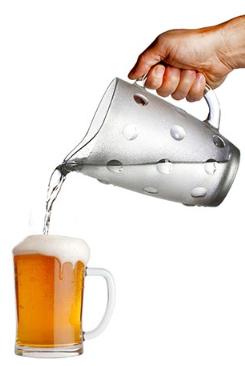Beer brewing is a complex process that involves ingredients, time, and patience. One of the most critical elements in beer crafting is water.
Water is essential in beer brewing as it brings out each beer style’s flavor, aroma, color, and clarity.
👉 Before you start your beer brewing, check out the brewing equipment for your brewing process as we jump up on why water is essential.👈
The Significance of Water in Beer Brewing
Water used in brewing beer must meet specific criteria. It should be free of minerals, salts, and other impurities that would affect the taste or aroma of the finished product.
Depending on the beer style, water used in brewing will have different pH and mineral content.
Brewing water chemistry can be confusing. But it’s not necessary to be.
Ironically, this straightforward natural substance is the most complicated.
To experiment with your finished beer, the intricate workings of the brewing water can be made simpler.
The Role of Water in Beer Brewing
Water makes up around 90-95% of the total beer volume, so it’s no surprise that it greatly impacts the final product’s taste and quality.
The minerals found in water can bring out certain flavors and nuances within beers, which can be used to craft different beers with distinct characteristics.
For instance, hard water containing higher levels of calcium sulfate can create a dryer finish in certain styles like pale ale or stout.
Soft water containing lower levels of minerals would be better suited for lagers or pilsners as it produces a smoother finish without overpowering other flavors.
The pH level also plays an important role when selecting water for beer brewing. Low pH levels (below 7) will make your beer more acidic, while higher pH levels (above 7) will make your beer less acidic and more mellow on the palate.
The ideal range for most beers is between 5-6 pH, which helps preserve hop bitterness while allowing malt sweetness to come through.
It’s worth noting that some brewers may choose to adjust their source water with additives like baking soda or calcium chloride to alter its mineral content and achieve their desired flavor profile.
Lastly, cleanliness is key when using water for beer brewing, as any impurities can ruin your batch!
Many brewers use filtered or distilled water to ensure no bacteria are present, which could lead to off-flavors or spoilage during fermentation.
Additionally, many brewers will opt out of tap water due to chlorine additives, which can leave behind an unpleasant aftertaste once the fermentation process is complete.
What’s in Your Brewing Water?
Keep an eye out for specific ions and minerals in the water, regardless of whether you have it professionally tested or test it yourself with a test kit.
pH and Alkalinity
The pH level of your water will determine how acidic or basic it is. Generally speaking, acidic levels fall between 0-7, and alkaline water levels fall between 7-14.
The ideal pH level for beer brewing is between 5-6, though it can vary depending on the beer style and brewing process.
Calcium, Magnesium, and Sodium Levels
Calcium, magnesium, and sodium ions help bring out certain flavors in beer. These minerals can be found in both tap water and filtered water.
- Calcium is beneficial for yeast health and contributes to the clarity of your brew. It helps create a strong yeast head, whereas magnesium aids with hop utilization during fermentation.
- Magnesium helps with bitterness from hops.
- Sodium can bring out malt sweetness, but it should be used in moderation, as too much can lead to an overly salty flavor.
Chloride and Sulfate Levels
Chloride ions contribute to malt sweetness and a fuller body, while sulfates can bring out hop bitterness.
However, too much chloride or sulfate in your water can lead to an overly bitter beer, so they should be used in moderation.
The ideal ratio of chloride-to-sulfate is between 1:1 and 2:1.
Brewing water affects a variety of beer traits, and the right combination of minerals is essential for producing the desired result.
Understanding the basics of brewing water chemistry allows you to craft better-tasting beer and experiment with new beer styles.
Suppose you wish to avoid diving into water chemistry. In that case, it is advisable to use reverse osmosis water from the water dispensers at grocery stores or distilled water, as it would be a blank canvas to start with.
Brewing Salts
The common brewing salts are calcium chloride, gypsum, Epsom salts, chalk, sodium chloride, and baking soda.
- Gypsum (CaSO4 or calcium sulfate) brings calcium and sulfate to the water during brewing. This and calcium chloride have a small degree of potential to lower the mash pH.
- Calcium chloride (Pickle crisp or CaCl2) is used to add calcium and chloride, and Epsom salt (MgSO4 or magnesium sulfate) is used for the magnesium and sulfate contribution. Plain old non-iodized table salt (NaCl2 or sodium chloride) brings sodium and chloride to the table.
- Chalk (CaC03 or calcium carbonate) has traditionally been used to increase mash pH when necessary, but it doesn’t dissolve effectively on its own and should be avoided in general.
- Baking Soda (NaHCO3 or sodium bicarbonate) is beneficial when the mash pH needs to be elevated, a rare occurrence.
- Lactic acid or phosphoric acid is the most popular acid used to reduce the mash pH when necessary.
To sum up, brewing water is an essential factor in beer making. It affects your beer’s flavor profile and should be considered carefully. With the right combination of minerals, you can produce a great-tasting beer every time!
RELATED: How to Filter Beer
Conclusion
Water is essential in creating great-tasting beers as it helps bring out unique flavors and aromas depending on its mineral content and pH level.
Brewers must also use clean and filtered water sources, as any impurities could ruin their batch!
For those looking to start with homebrewing or craft breweries alike, understanding how different waters affect the overall taste is one surefire way to get you closer to crafting your great beer!




